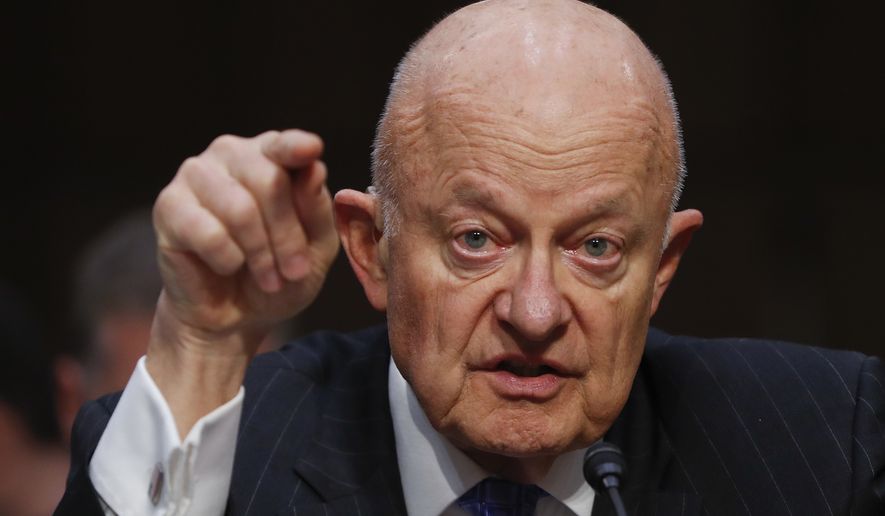Top Obama administration officials told the House Intelligence Committee they had no “empirical evidence” the Trump campaign conspired with Russia ahead of the 2016 election, transcripts released Thursday revealed.
“I never saw any direct empirical evidence that the Trump campaign or someone in it was plotting/conspiring with the Russians to meddle with the election,” former Director of National Intelligence James Clapper told the committee in 2017.
“That’s not to say that there weren’t concerns about the evidence we were seeing, anecdotal evidence. … But I do not recall any instance where I had direct evidence,” he continued.
The bombshell revelation was laid bare in the transcript of Mr. Clapper’s closed-door interview as part of the Intelligence Committee’s probe into Russia’s 2016 presidential election interference.
Mr. Clapper wasn’t the only Obama official who acknowledged there was no hard evidence of ties between Russia and the Trump campaign.
Former National Security Adviser Susan Rice said there was no smoking gun.
“To the best of my recollection, there wasn’t anything smoking, but there were some things that gave me pause,” she said, according to the transcript. “I don’t recall intelligence that I would consider evidence that I saw…conspiracy prior to my departure.
Former U.S. Ambassador to the United Nations Samantha Power said she was “not in possession” of any evidence the Trump campaign conspired with Russia.
Even high-ranking Justice Department officials appeared in the dark about potential evidence.
Then-Attorney General Loretta Lynch said she did not recall being told about hard evidence of collusion, conspiracy or coordination.
Former FBI Deputy Director Andrew McCabe, meanwhile, admitted the FBI couldn’t verify the anti-Trump dossier compiled by British ex-spy Christopher Steele.
“We have not been able to prove the accuracy of all the information,” he told the committee.
“You don’t know if it’s true or not?” a House investigator asked.
“That’s correct,” Mr. McCabe replied.
The stunning revelations were made public Thursday when the House Intelligence Committee released transcripts of 57 closed-door interviews with witnesses during the panel’s investigation into Russia’s 2016 election interference.
The transcripts total more than 6,000 pages and include interviews with some of the biggest names in Washington, including Donald Trump Jr., Hope Hicks, Steve Bannon, Michael Cohen, Roger Stone, Jared Kushner, Corey Lewandowski and Michael Caputo.
The committee, led by Rep. Adam B. Schiff of California, made the transcripts public after Acting National Intelligence Director Richard Grenell wrote him a letter saying the transcripts had been released for classified material and were ready to be made public.
Mr. Schiff had blamed the White House for the delay in releasing the transcripts publicly. He said the White House didn’t want the material public because it details the Trump campaign’s embrace of Russian help in the 2016 presidential election.
“The transcripts released today richly detail evidence of the Trump campaign’s efforts to invite, make use of, and cover up Russia’s help in the 2016 presidential election,” Mr. Schiff said in a statement.
The committee conducted the Russia investigation when Congress was controlled by Republicans and the panel was led by Rep. Devin Nunes, California Republican.
In April 2018, the committee released a redacted report authored by Republicans summarizing its findings. The report was accompanied by the Democrats’ dissenting report.
The Republicans said they had found “no evidence of collusion, coordination or conspiracy” between the Trump campaign and Russia, a finding that was later backed up by former special counsel Robert Mueller, who spent almost two years investigating Russian interference.
As Washington was abuzz about the Russia investigation, a bipartisan committee vote in September 2018 authorized the release of witness transcripts pending a classification review by the Office of Director of National Intelligence.
But months later, the release process ground to a halt when Democrats opposed the office sharing some transcripts with the White House.
Mr. Schiff insisted the transcripts belonged to the committee and accused the ODNI of giving the White House a chance to “claw back” information that should be provided to Congress.
The stalemate continued into this week, when Mr. Grenell told Mr. Schiff the transcripts were ready to be released. Mr. Grenell said the contested transcripts had not been shared with the White House.
“The transcripts released today richly detail evidence of the Trump campaign’s efforts to invite, make use of, and cover up Russia’s help in the 2016 presidential election,” Mr. Schiff said in a statement.
The committee conducted the Russia investigation when Congress was controlled by Republicans and the panel was led by Rep. Devin Nunes, California Republican.
In April 2018, the committee released a redacted report authored by Republicans summarizing its findings. The report was accompanied by the Democrats’ dissenting report.
The Republicans said they had found “no evidence of collusion, coordination or conspiracy” between the Trump campaign and Russia, a finding that was later backed up by former special counsel Robert Mueller, who spent almost two years investigating Russian interference.
The Senate conducted its own investigation into the matter and is expected to release its final conclusions later this year.
• Jeff Mordock can be reached at jmordock@washingtontimes.com.




Please read our comment policy before commenting.